| Many modern readers who love Jane Austen are eager to find ways to acquit her of being a woman of the long 18th century. Clutching My Pearls is my ongoing blog series about my take on Jane Austen’s beliefs and ideas, as based on her novels. Click here for the first in the series. |
| |
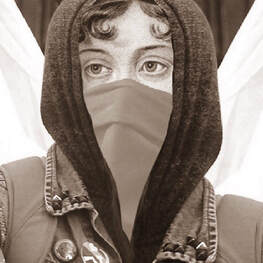 Was she radical?
Was she radical? Granted, I'm not an academic. My eyes glaze over at mentions of Derrida and Foucault—all that stuff is just beyond me. I'd like to know more about Austen's contributions to the development of the novel, but modern scholars have moved beyond that. Or rather, they seem to take it for granted that Austen was writing at such an advanced level of subtlety and symbolism that the merest object or reference—an apricot, a shawl, a hedge, a surname—can unlock the key to a hidden level of meaning that exists underneath and often in contradiction to the narrative. I'm unconvinced: would an author of her time, even an author of genius, write novels about happy marriages that aren't really about happy marriages at all?
I have no quarrel with individual reactions to Austen, or with what people draw out of Austen. But I do differ with those who ascribe improbable opinions to Austen, hence the following rebuttal.
For my 100th blog post, I offer six simple questions which I think academics might profitably ask themselves when formulating their theories about who Jane Austen was, and what she believed...
| First test: When you formulate a theory based on something you’ve found in the text, have you checked to see if your theory is challenged elsewhere in the text? |
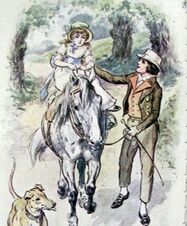 Timid and Weak
Timid and Weak Wouldn’t it be incumbent upon you to take into account the fact that Austen shows contempt for bodily weakness in Pride and Prejudice (Mrs. Bennet, Anne de Burgh) and ridicules it in Persuasion (Mary Elliot Musgrove), and—most notably--in Sanditon (the three Parker siblings). How can you discuss Austen’s attitudes toward invalidism without bringing Mr. Woodhouse and Mrs. Churchill of Emma into your discussion? Their invalidism doesn’t “marginalize” them, it gives them passive-aggressive power over everyone around them.
Surely these alternate portraits of invalids--three of them written after Mansfield Park—pose a challenge to your theory about Austen’s attitudes? Surely at least one of the peers who read this peer-reviewed article raised these questions?
Another example: let’s say that you view Maria Bertram as the tragic heroine of Mansfield Park, as Jillian Heydt-Stevenson does: “Maria’s crime, her refusal to abdicate strong sexual passions, and, in her elopement, her rejection of the culture’s conviction that one can achieve tolerable marital happiness by marrying for money, all become the mirror of what most seriously threatens society.” and “Maria’s expulsion, when she refuses to follow anyone’s idea of matrimony, functions to throw down the gauntlet in front of Sir Thomas.”
Taking this apologetic view of Maria involves some industrial-strength over-looking of the actual text and the authorial comments Austen makes about Maria. Austen plainly tells us that Maria deliberately chose to marry Mr. Rushworth, a man she holds in "contempt." The other characters openly discuss the fact that she's marrying for money and status. Her father offered to get her out of her engagement and she turned him down. "Anyone's idea of matrimony" also involves the teachings of the Anglican church, a cultural consideration that is absent from Heydt-Stevenson's analysis. (Update: for an excellent explanation of what devout people of Austen's time believed and how Austen's religious beliefs are present in her writing, try this book).
| Second test: If you are going to point out something that strikes you as interesting or significant in Austen, have you checked to see if the interesting/significant thing Austen did is in any way different from what her contemporaries were doing? Have you placed the thing you've noticed in its historical and literary context? |
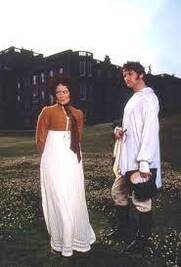 "The deepest blush"
"The deepest blush" Another example: Suppose you're writing your university thesis on the topic of blushing in Austen’s novels. Did your thesis advisors suggest that you explore whether Austen's use of blushing is similar to, or different from, every single other novelist of the period? Well, they should have. A deep blush suffuses the cheek of the heroine in every novel, and I mean every novel. Shouldn't you place your discussion of Austen's treatment of blushing within the context of the culture's relentless obsession with blushing?
Another example: If you point out that Austen tends to turn her authorial gaze away especially at a moment of high emotion, shouldn’t you also explain that this was a literary convention in her day?
Here is Daniel Stout pointing to the passage describing Fanny’s reunion with her brother William in Mansfield Park: “Their eager affection in meeting, their exquisite delight in being together, their hours of happy mirth and moments of serious conference may be imagined; as well as the sanguine views and spirits of the boy even to the last, and the misery of the girl when he left her.” Stout remarks: “Even where, as here, the narrative seems to set itself an opportunity to show us Fanny rather than tell, to represent rather than conjecture, it doesn’t follow through.”
So you might think, “Wow, isn’t that interesting. Austen really turns away from describing Fanny's emotions.”
However, this insight lands a little differently when we know that Austen’s “may be imagined” is a variation on a common phrase of the period. It was very common to describe people’s emotional reactions as something that could be “more easily imagined than described" or "better conceived than described."
Some examples: "Detached from her friends, and in the midst of an enemy's country, her situation may be much more easily imagined than described."(1785) "What his feelings were when he found that they had eluded his vigilance, may be more easily imagined than described." (1820) Willoughby references the fact that it's a cliché in Sense and Sensibility: "When the first of her [letters] reached me... what I felt is—in the common phrase, not to be expressed."
To return to Jillian Heydt-Stevenson's suggestion, above, that Maria Bertram's "crime" was to challenge society's approval of mercenary marriage—whatever the reality of the times, obviously the literature and plays of the day disparaged mercenary marriages and fortune hunters, it was a common theme both in tragedies and comedies. Maria Bertram is an exemplar of someone who comes to a bad end because of her lack of principles. She's not a protest figure.
| Third test: Is your talent for finding hidden meanings--usually salacious-- in Austen’s text, simply a failure to understand the connotation or common usage of a word or phrase in Austen's time, or a failure to take context into account? Did you "consider times, persons, and probabilities"? |
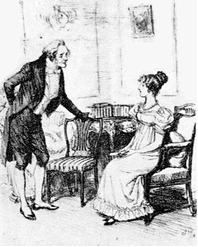 Old perv or old-fashioned gallantry?
Old perv or old-fashioned gallantry? John A. Dussinger argues that when Mr. Woodhouse pays his pro forma compliments to the newly-married Mrs. Elton, and she calls him her “old beau” and declares that her husband will be jealous, this means he desires her as a sexual partner.
"Ironically, though again no one in the scene appears to notice, it takes Mrs. Elton’s vulgar airs to pronounce the unthinkable about Mr. Woodhouse.”
Maybe no character in the scene “appears to notice” because this hidden sexual undertone is not there in the first place, and arises out of Dussinger’s placing a bizarre and unfounded connotation on this exchange between two people who are using forms of etiquette which were banal and trite (hence used for comic purposes) even in their time.
Another example: Heydt-Stevenson thinks that when Mary Crawford speaks of girls who are “dying” for Henry Crawford in Mansfield Park, she's making a sly reference to orgasm.
Yes, “dying” was, still can be, be a euphemism for orgasm, just like “come.” I remember my college choir director pointing out how "I die" comes at the climax of the musical line when we sang John Dowland’s “Come Again.” But that doesn't mean an author always intends that connection; many people besides Austen used and still use the phrase "I'm dying to..."
| Fourth test: Is your insight into Austen’s true meaning something that nobody has noticed in 200 years? If so, have you considered the possibility that you are projecting a meaning on to the text which conforms to your ideological agenda? Have you applied Occam's Razor and remembered that novelists are in the business of telling stories? |
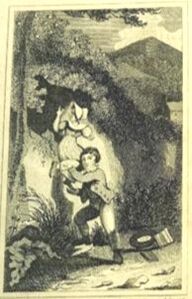
Kelly repeated this assertion in a recent British television show, Britain’s Novel Landscapes, when the host, Mariella Frostrup, brought her onto the program to explain that when the word "hedge" or “hedgerow” appears in Emma, it is “incredibly politically loaded.” Kelly told Frostrup this is something “we don’t see” today, because we've lost our understanding of its hidden meaning, but “in the 1810’s, this is basically a big political flashing sign.”
“Wow,” Frostrup responds. “So, did any other writers dare to use the word ‘hedge’ in their novels?”
No, she didn't say that. just kidding. And of course many authors mentioned hedges. Isn't it incumbent on Kelly to explain why the use of “hedge” in other novels was or was not "a big political flashing sign"?
Here are two examples Kelly could go to work on, where hedges are not merely mentioned in passing--as in Emma—but are so central to the plot they are shown in the engraved frontispiece of the novel:
A children’s book, The Hedge of Thorns (1819), is a moral tale (naturally) about a boy who tries to push his little sister through a gap in a "quickset hedge" to get at an apple orchard. She gets scratched up and she tears her pinafore, and their poor but exceedingly devout parents pretty much threaten the boy with eternal hellfire for the attempted theft.
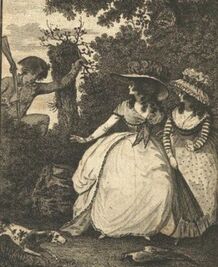
In the Village of Martindale (1787), the author uses a hedgerow as a convenient device for the sudden intrusion of the novel’s villain upon the heroine and her friend.
Ophelia and Maria go for a long walk, then ‘lay down to rest themselves on some fallen trees that lay under a hedgerow, in a wheat stubble.”
The girls are admiring the pastoral view before them: “when a pointer suddenly sprang over the hedge; and before they could recover from their surprise; a gun went off so near them, that the shot rattled through the bushes, and passed just over their heads. A gentleman almost immediately burst through the enclosure, and ran to pick up a pheasant he had shot, which had fallen within a few yards of the place where they were sitting.”
That passage includes the supposedly politically-loaded word “enclosure,” and Emma does not.
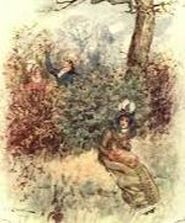
I don't know about you, but I don't see a big political flashing sign. I see mentions of hedges. And in general, I don't see critics explaining how they know a hedge or a shawl or an apricot in Austen is more significant than a hedge or a shawl or an apricot in some other book.
The "slight hedge" in Emma serves a narrative purpose. Harriet Smith is out walking with a companion (because of course she wouldn't walk by herself.) Austen has to get rid of that companion to place Harriet in a faux-dramatic situation so Frank Churchill can "rescue" her. Harriet's friend is able to run up a bank and jump over a "slight hedge" to get away from the gipsies. Harriet can't because she has a muscle cramp. The hedge helps set up the situation of Harriet being all alone and surrounded by gypsies.
In Persuasion, the hedgerow restricts what you can see, but you can still hear what's happening on the other side. Austen uses a hedgerow so Anne Elliot can overhear Captain Wentworth's conversation with Louisa Musgrove.
I find that modern critics often forget to think about the demands of story-telling, so intent are they on finding the hidden message. Occam's razor should apply. The error of supposing that Austen means something significant by the word "hedge" arises from the cumulative failure to apply all the critical tests I've listed above.
| Fifth test: Are the opinions you are ascribing to Austen so radical, and so contrary to what might be acceptable in a novel marketed to mostly female readers, that she would have been unpublishable? OTOH, if your answer is, "nobody noticed it because Austen had to be sly and covert," have you checked to see if others wrote openly about the things you say Austen could only hint about? |
An example of the not-radical-at-all: Helena Kelly argues Austen had to be covert with her anti-slavery message in Mansfield Park: "It was a time of censorship and state surveillance." Marcus Wood has the opposite explanation, Austen chose to be extremely subtle in Mansfield Park because people were tired of lurid abolitionist literature which openly portrayed the cruelty of slavery: "the ideological waters surrounding slavery were muddled, not to say poisoned, by the propaganda wars of the preceding three decades. Had a writer of her subtlety even wished to enter the field... she would have had little that was topical to write about."
Likewise, on what historical basis did Kelly conclude that dropping the word "hedge" into Emma (and not the word "enclosure") was as far as Austen could go in protesting land enclosure? And where Kelly is certain that Austen is sending a covert protest about the dispossessed rural poor, scholar David Aers is equally certain that she isn't, and he's mighty disappointed in her: When Aers looks at Emma’s conversation with Harriet about ‘the poor’ in Highbury, he asks his readers to “notice that Jane Austen does not begin to wonder why ‘they’ are so poor when… Emma [and] Mr. Knightley are so immensely affluent.” He concludes: “Jane Austen systemically closes up her imagination against critical alternatives…. [she fails] to transcend the narrow limitations of her historical class.”
Did Aers check to see if any of the other heroines in the other novels pull themselves up short while delivering broth and baby linen to say, "wait a minute, is this suffering caused by the rise of agrarian capitalism?" Or does only Austen get this kind of judgmental scrutiny?
| Sixth and Final Test: Is your interpretation unfalsifiable? Are your assertions indistinguishable from parody? If so, does this not raise some questions about the validity of your interrogative methods? |
Where Helena Kelly sees political meanings in material objects in Austen, Jillian Heydt-Stevenson sees the objectification of women— just as we saw with their differing interpretations of the cross and chain in Mansfield Park. Can they both be right?
Here are three different interpretations of the significance of a sentence in Emma about Hartfield, the Woodhouse estate in Highbury. In each case, it's impossible to know if Austen intended this kind of interpretation or emphasis. Two are serious and one is a parody. Which is which?
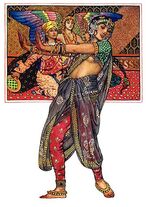
- Imperialist: It's easy to miss Austen's covert meaning here: 'notch" alludes to "notch-girls" and confirms that Hartfield was built with the spoils of East Indian plunder, not rents from land-holdings. The modern rendering of this word is 'nautch.'"
- Post-modernist: “Hartfield is a parergon: part of Donwell, though in the negative mode of the notch; neither inside nor outside. It is the not-Donwell in Donwell or the Donwell out of Donwell.”
- Sexual: “Austen sets in context, however, how little power Emma has... That detail questions whether in this match and in this society, Emma is anything more than a ‘notch’ –slang for female genitalia...”
Personally, I think the word "notch" means "notch."
Heydt-Stevenson also thinks the Miss Bates's chimney is significant: “Miss Bates hilariously interlaces the usual phallic signification of chimneys with the rivet in her mother's spectacles, which Frank Churchill wants to make 'quite firm.'"
Just kidding, that was me again. But actually, Heydt-Stevenson did think Miss Bate's speech about the kitchen chimney needing to be swept was laden with innuendo and--no surprise here--demonstrates the objectification of women. Here is Heydt-Stevenson: “The women of Emma, all of whom—at least at one level of signification—are themselves chimneys. That is, their function is to remain fixed in place, designed to heat, to pleasure, and to heal others.”
Another example: Suppose I take a single word from Austen, and write a blog post about its liminal subversive covert significance, using an absurdly far-fetched allusion, and I don’t mean a single word of it, and I post it on April Fool’s day, and nobody says, “oh, is this a joke?”
Previous post: Celia, the Smiling Heroine Next Post: Fun with Fannies....
|
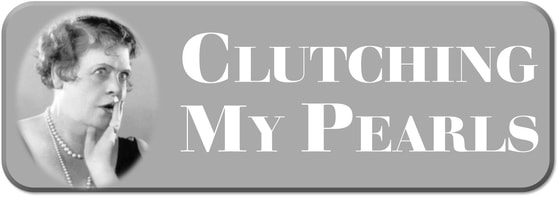
 RSS Feed
RSS Feed